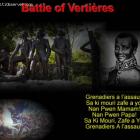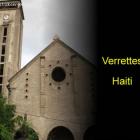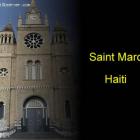ADVERTISEMENT
Entertainment
The principal entertainment that we will address in this section are Movies and comedies. There are many talent Haitian individuals performing in there areas. Some of them have reached the international level
Haiti National Carnival 2015, "Nou tout se Ayiti"
On Sunday, 15 February, 2015, President Martelly had inaugurated the National Carnival 2015 on the theme "Nou tout se Ayiti" (or "We are Haitians") at the National Palace. In the last three years, the national carnival had been held in three provincial cities: Cayes (2012), in Cap-Haitien (2013) and Gonaïves (2014).
During the occasion, Dithny Joan Raton, the Haitian Minister of Culture and the Honorary President of the National Carnival Committee, had expressed his satisfaction over the preparation for the 3-day celebration during from February 15 to 17. Sixteen musical groups and 125 disguised bands took part in the parade.
Haiti Carnival Floats
Mardi Gras' or 'Fat Tuesday' is a Christian holiday and a popular cultural festival which is celebrated on the day before the religious season of Lent that begins on Ash Wednesday. It also has links to the Christmas season through the period known as Carnival. The festival is celebrated in many countries dominated by the Roman Catholic populations. Parades are a major part of celebrating Mardi Gras since the day when the 'krewes' began parading through New Orleans over 100 years ago. The crude early floats during the mid 1800's were often accompanied by young slaves, and free men of color (known as flambeaux carriers) who carried torches to light the way for floats and bands during Mardi Gras night parades. 'Krewes' are the groups with hereditary membership whose members organize and participate as costumed paraders in the annual Mardi Gras carnival. Each Mardi Gras Parade Krewe has a unique history and theme. This most famous public festivity draws thousands of tourists and revelers every year. Popular practices on Mardi Gras include costumes and wearing masks, dancing, overturning social conventions, sports competitions, parades, debauchery, etc. The first official Mardi Gras parade celebrated in the U.S was at Mobile, Alabama in 1703 under the French rule. The true origins of Mardi Gras can be traced all the way back to ancient Greece and Rome, and along with Christianity, Mardi Gras spread from Rome to other countries such as Brazil, New Orleans, Venice, Colombia, Trinidad and Tobago, Mexico, and Canada.
Barikad Crew Electrocuted in Kanaval, Phantom in Critical Condition
Following a major accident on the second day of Kanaval in Port-au-Prince, on February 17, 2015, 17 people died and at least 60 were injured of stampede in an ensuing panic by the bystanders. According to the news agency report, when float of the Barikad Crew was passing through on Rue Capois near the Champ de Mars, the star rappers of the Barikad group, known as Phantom, was reported to be the one who first received the electric charge.
He was standing on the float and removed a high tension power line with a pole so that their float can pass under it. Some of the victims were immediately electrocuted in a flash of sparks. Most of those killed appeared to have been trampled to death as the crowd surged away from the Carnival float. However, Phantom was in stable condition; the physicians were surprised that the singer didn't suffer a heart attack or die after coming in contact with the power line.
The festival of Mardi Gras in Haiti
Carnival in Haiti is the most popular festival that unites an explosion of music, food, dance and costume. The festival originated with Italian Catholics in Europe, later spread to the French and Spanish, who brought the pre-Lenten tradition when they settled (and brought slaves to) Haiti, Trinidad, Dominica, Martinique, and other islands. The word Carnival itself means "farewell to the flesh," that refers to the former Catholic practice of abstaining from red meat from Ash Wednesday until Easter.
The Caribbean's carnivals all have several common themes, many were originated from Trinidad and Tobago Carnival because it is believed that the first "modern" Caribbean Carnival was originated in Trinidad and Tobago in the late 18th century, when French émigrés brought the Masquerade tradition with them, although the celebrations of 'Fat Tuesday' were taking place at least a century ago. The popular practices of Mardi Gras costume include wearing masks, capuchons, and costumes, drinking alcohol, dancing, overturning social conventions, feasting, begging, whipping, etc.
Does Haiti have better Mardi Gras Costumes
The traditional Mardi Gras ball is a lavish affair, calling for floor-length gowns for women and tuxedos for men. For the parades leading up to Mardi Gras, it's casual, comfortable attire. Nobody attends the Mardi Gras celebration in a simple way. It is a celebration of eating richer, fatty foods, preceding the fasting season of Lent. The Celebrations vary from city to city. Mardi Gras celebrations feature masks, costumes, beads, debauchery, and letting your inhibitions go. Children dress in fairies, butterflies, clowns, princess or as their superhero. Men's Mardi Gras costumes include court jesters, gladiators, crawfish and many others. The more outlandish is the costume, it is better. However, some partygoers tend to tone things down by wearing more subtle costumes in the Mardi Gras colors of purple, turquoise, and gold.
Carnival celebration in Haiti and other Countries
Carnival is a pre-Lent festival often a blend of local pagan and catholic traditions that announces the end of winter and welcomes the spring. The true origins of Mardi Gras can be traced all the way back to the ancient Greece and Rome, and along with Christianity, Mardi Gras spread from Rome to other countries such as Brazil, New Orleans, Venice, Colombia, Trinidad and Tobago, Mexico, and Canada. The largest and one of the most famous festivals is held in Rio de Janeiro, Brazil. It is the mother of all Carnivals and an absolute bucket list must-do, at least, once in a lifetime. Some of other best carnivals are held in Tenerife (Canary Islands), Venice Carnival, Italy, Binche Carnival, Belgium, Mardi Gras, New Orleans, USA, Cadiz Carnival, Spain, Oruro Carnival, Bolivia, Viareggio Carnival, Italy, Trinidad and Tobago Carnival, and Notting Hill Carnival, London. Mardi Gras is celebrated in most countries with Christian dominance.
Can Haiti Carnival be compared Carnival in Rio?
The Carnival celebration in Haiti is a time of art, song, dance, and costume that has many observable features and symbolic meanings. Haiti takes to the streets with striking costumes and dance during the parades. It is a time for self-expression and creativity which helps to unite people of the world with the same beliefs. Port-au-Prince's annual carnival is one of the largest Mardi Gras carnivals in the Caribbean and North America. It is celebrated with music, bands and parades with colorful floats on the trucks. Carnival goers dance, sing, embrace, eat and drink all day and night until the sun came back out again-- it is "Plezi Gaye" (Fun All Over). A delight to watch the beautiful firework demonstrations, gorgeous costumes, and colorful schemas, all the while the people chanting the lyrics to inspiring Kompa, Creole Rap, and Root Music .
Don Kato unsure he will appear at Carnival
Brothers Posse's lead vocalist, Don Kato, is queasy about accepting an invitation to perform at this year's carnival. In 2013 and 2014 Kato was shunned by the National Carnival (NC) committee, which had something to do with President Martelly interfering in the selection process.
The reason behind the two-year ban was Kato, along with other musicians in 2013, sang songs at carnival that were unfavorable toward the Martelly government. Martelly, although signaling he was not annoyed by the anti-government lyrics, nonetheless indulged in some double-talk during a radio interview. He made an invalid comparison between the songs' attacks on his government to the carnival theme, environmentalism. He said the critical lyrics were out of place with such a theme.
Ironically, Martelly, known as former singer Sweet Micky, himself was prone to attacking the Haitian government at carnival time.
Beach Cocoyer of Petit-Goave hosting first edition of "Festi Cocoyer"
After a bit of controversy early last year following the turning away of medical personnel from America, Beach Cocoyer is once again shrouded in controversy. In March 2013, residents from two villages in the third communal section of Petit- Goâve, Trouchouchou and Cocoyer, responded after the doctors, who were set to administer free care to the area on the site of the beach, were asked to pay for use of the beach. Reports were that the American delegation was assaulted.
Now this year, the highly turbulent night of August 17 shone another less than desirable light on the Beach when the staging of the first edition of the Festival Notre-Dame of Petit- Goâve, or Festi Cocoyer, ended with heavy gunfire, tear gas and violent beatings.
Kombite Outaouais 8th edition of the "Festival Haiti en fete in Canada
Kombite Outaouais, is proudly announcing the 8th edition of the "Festival Haïti en fête".
Thanks to the support offered by the Canadian Government through Building Communities Through Arts and Heritage program, the festival Haïti en fête in Canada will present the public a wide selection of musical and dance performances that will highlight the culture of Haiti and bring some freshness to the summer of 2014.
As Royal Galipeau, Member of Parliament (Ottawa-Orléans), announced, the festival will receive a designated sum of $11,200. The money goes to "Kombite Outaouais", the official organizer of the festival that is to take place from July 18 to 20, 2014 on the special location of Petrie Island, east of Ottawa.
Our objective is to share with you news and information about Haiti and the people of Haiti. Traditions, habits and the way we were or grew are alive in this site. We highly recommend that you Subscribe to our Newsletter and also share with us some of the things that are memorable and made us unique people.

 Battle of Vertieres
Battle of Vertieres  Life After Death
Life After Death  Haitian Creole Translation
Haitian Creole Translation  Verrettes, Haiti
Verrettes, Haiti  Saint Marc, Haiti
Saint Marc, Haiti